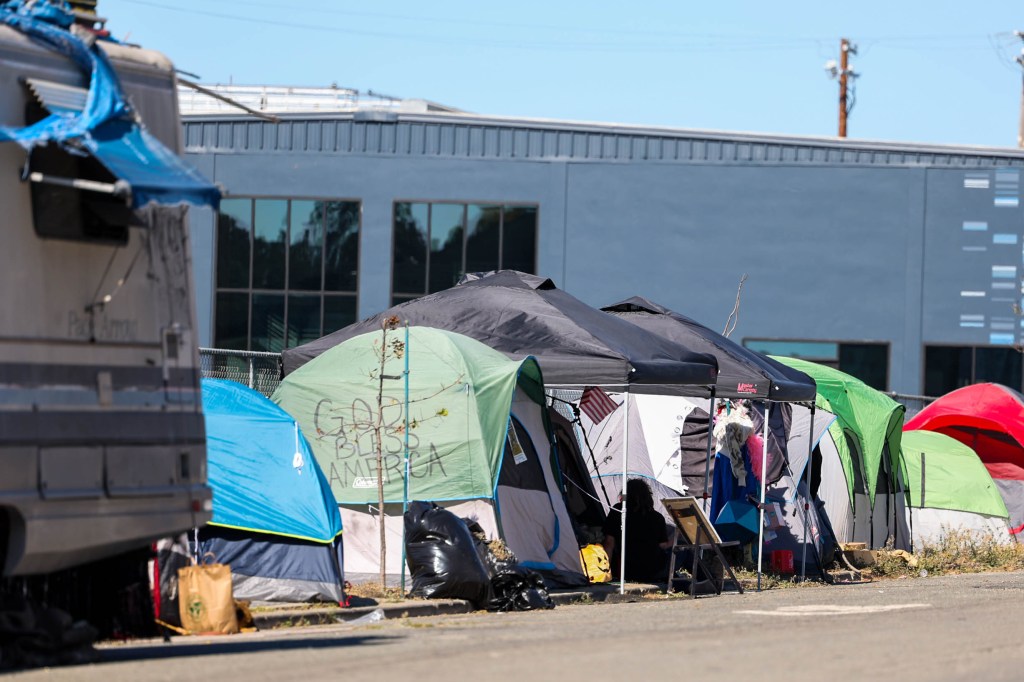
BERKELEY — After spreading their footprint in Berkeley, the groups behind multiple protest encampments in the city are encouraging others across California and the nation to use the same form of civil disobedience to bring to light what activists have described as aggressive encampment policies implemented at the local and state level.
Demonstrators with the nonprofit Where Do We Go Berkeley and the Berkeley Homeless Union have occupied the front lawn of Berkeley’s Old City Hall for nearly three weeks and established two more sites this week, each with the group’s trademark red and blue tents scrawled with black paint asking “Where Do We Go?”
The “guerrilla encampments,” as dubbed by Where Do We Go Berkeley President Ian Cordova Morales, are genuine homes for Berkeley’s unhoused, he said during a press conference outside of the three sites Wednesday. But they’re also meant to act as “symbols of safety and protection and protest,” said Where Do We Go co-founder Andrea Henson.
“We call on everyone; when you see these tents, it’s unhoused individuals fighting back, having a voice and expressing their First Amendment right to freedom of speech and protest. And wherever you see these tents you will see us protecting them,” Henson, an attorney focused on homelessness, said during the press conference.
The protest is in reaction to a shift in federal, state and local stances on homelessness and encampments. A U.S. Supreme Court ruling in June, known as the Grants Pass decision, gave state and local governments greater power to sweep homeless encampments regardless of whether shelter beds are available.
Following that decision, Gov. Gavin Newsom issued an executive order directing state agencies to clear encampments “with urgency and dignity” and threatened to withhold funding from local jurisdictions that failed to comply. He then announced cities and counties would be receiving millions of state funding to conduct encampment clearing.
Of the seven local governments receiving a total of $48 million, Berkeley’s share is $5.8 million.
After the Supreme Court decision and executive order, but before the funding announcement, Berkeley councilmembers approved a new policy allowing staff to sweep encampments without offering shelter if city officials determine the site poses a fire hazard, imminent health hazard or public nuisance, or is in dangerous proximity to traffic, construction zones or utility work.
Morales called the more aggressive approach “fascist,” “draconian,” and a “backslide in American democracy.”
“This is also a call to action for the rest of California, the rest of the West Coast, the rest of the United States to take action, to join us in establishing these guerrilla encampments, to join us in resisting, to join us in fighting to change what is happening here, because if we don’t fight now, we may never get the chance again,” Morales said.
City officials have defended the policy as a narrowly crafted measure meant to balance the needs of all city residents, asserting it would apply to a small number of the city’s unsheltered residents.
Berkeley spokesperson Matthai Chakko said in an emailed statement that the city has reached out to both encampment residents and demonstration leaders. The group was most recently contacted Wednesday to resolve an issue raised by a community member, he said. The group has not yet responded, he added.
“We’ve continued to act in accordance with best practices to end homeless and proactively offered connections to housing and services,” Chakko said.
Berkeley is home to about 900 unsheltered residents, according to the most recent Point-In-Time count conducted annually. More than half of those residents live on the street in tents, makeshift shelters or vehicles as opposed to temporary shelter facilities.
Beyond access to services though, Henson said the group is demanding a seat at the table to discuss policy. Specifically, Where Do We Go Berkeley wants to see unsheltered residents granted similar protections afforded to tenants and property owners.
Berkeley’s municipal code currently limits the space an unhoused person’s belongings can take up on the sidewalk to a 9-square-foot area, and state shelter eviction laws are less strict than those for renters.
“When you’re unhoused, your very existence is unlawful,” Henson said.
Maitée Rossoukhi, another city spokesperson, said in an email that the City Manager’s Office has not been contacted with requests that can be met. Policy discussions were held publicly in September when councilmembers considered the policy proposal brought forward by Councilmember Rashi Kesarwani, Rossoukhi said.

















































